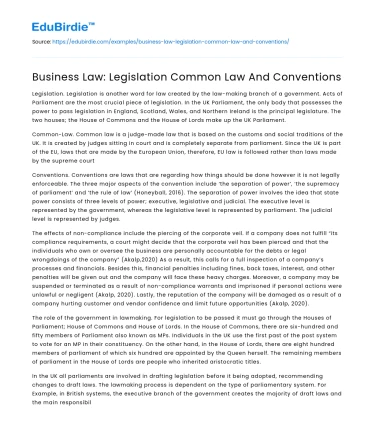Introduction
Business law is an intricate tapestry woven from varied legal threads, encompassing legislation, common law, and conventions. Each component plays a critical role in shaping the framework within which businesses operate, affecting everything from contractual obligations to dispute resolution. Legislation provides a formalized set of rules, established through statutes and regulations, which businesses must adhere to maintain compliance. Common law, on the other hand, evolves through judicial decisions and precedents, offering a dynamic and adaptive legal landscape. Conventions, though often informal, guide business practices through established norms and ethical standards. Understanding the interaction among these elements is crucial for navigating the complex legal environment in which businesses function. This essay explores how legislation, common law, and conventions collectively influence business law, underscoring their significance through examples and case studies.
Legislation: The Foundation of Business Law
Legislation forms the backbone of business law, establishing the legal parameters within which businesses must operate. Statutes and regulations are enacted by governmental bodies to create a structured legal environment, ensuring fairness, protecting stakeholders, and promoting economic stability. One clear example is the Sarbanes-Oxley Act of 2002, which was implemented in response to corporate scandals to enhance corporate governance and restore investor confidence. This legislation imposes stringent auditing and financial regulations on companies, highlighting the role of statutory law in safeguarding public interests.
Save your time!
We can take care of your essay
- Proper editing and formatting
- Free revision, title page, and bibliography
- Flexible prices and money-back guarantee
While legislation provides a clear-cut framework, it is not without its challenges. Laws can sometimes lag behind rapidly evolving business practices, leading to regulatory gaps. For instance, the digital economy has outpaced existing legal frameworks, necessitating new legislation to address issues such as data privacy and cybersecurity. Thus, while legislation is foundational, it requires periodic updates to remain relevant and effective.
Transitioning from legislation to common law, it is essential to understand that while legislative enactments provide the rules, common law offers interpretation and adaptability. This interplay ensures that the legal system remains robust and responsive to emerging challenges in the business world.
Common Law: Judicial Precedents and Business Adaptation
Common law is characterized by its reliance on judicial precedents, providing a flexible and responsive legal system that can adapt to new circumstances. It is particularly influential in areas where statutory law may be silent or ambiguous. Through the doctrine of stare decisis, courts interpret and apply laws based on previous rulings, thereby shaping business practices over time. A notable case illustrating this is the landmark decision in Donoghue v. Stevenson (1932), which established the principle of duty of care in negligence, profoundly impacting product liability and consumer protection.
However, common law is not without criticism. Critics argue that it can lead to inconsistencies and unpredictability, as different courts may interpret laws differently. Furthermore, the reliance on precedents can sometimes slow the pace of legal reform, as courts are bound by previous decisions until overturned by higher authorities. Nevertheless, common law remains a vital component of business law, offering a degree of flexibility that purely statutory systems may lack.
In transitioning to conventions, it is important to recognize that while legislative and judicial systems provide formal structures, conventions offer informal guidance, bridging gaps where formal law may not reach. This allows for a more comprehensive understanding of business operations within the legal framework.
Conventions: Informal Norms and Ethical Standards
Conventions in business law refer to the unwritten rules and ethical standards that govern business conduct. These may include industry-specific practices, corporate governance codes, and international trade customs. Conventions help businesses navigate areas where formal laws are either absent or insufficiently detailed. For instance, the United Nations Convention on Contracts for the International Sale of Goods (CISG) provides a framework for international trade, harmonizing contract law across different legal systems.
Conventions often evolve from long-standing practices and mutual agreements among industry participants, promoting consistency and predictability in business dealings. However, their informal nature can also lead to ambiguity and enforcement challenges. Unlike legislation and common law, conventions lack legal authority, relying instead on voluntary compliance and industry pressure.
As we transition to the conclusion, it is evident that legislation, common law, and conventions each play distinct yet complementary roles in shaping business law. Their interplay ensures that the legal system is comprehensive, adaptable, and responsive to the needs of modern commerce.
Conclusion
In conclusion, business law is a multifaceted domain shaped by the interplay of legislation, common law, and conventions. Each element contributes uniquely to the legal landscape, offering a blend of stability, adaptability, and ethical guidance. Legislation provides the formal framework necessary for legal certainty, while common law offers flexibility through judicial interpretation. Conventions, although informal, guide ethical business practices and fill gaps in the legal system. Together, these components create a comprehensive legal environment that supports and regulates business activities. Understanding this interplay is crucial for legal practitioners, policymakers, and business leaders alike, ensuring they can navigate the complexities of modern commerce effectively and ethically.






 Stuck on your essay?
Stuck on your essay?

